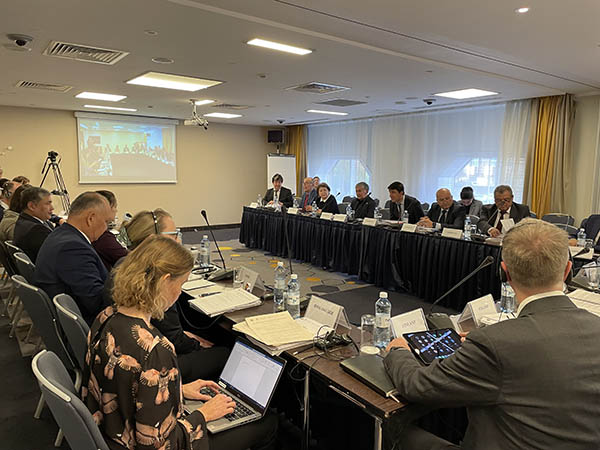REGIONAL WORKSHOP “INTERNATIONAL EXPERIENCE RELATED TO TRANSBOUNDARY WATER ALLOCATION AND PROSPECTS FOR THE DEVELOPMENT OF COOPERATION ON THE JOINT USE OF WATER RESOURCES IN CENTRAL ASIA”
The regional workshop “International experience related to transboundary water allocation and prospects for the development of cooperation on the joint use of water resources in Central Asia” was held in Astana on November 2-3. The workshop was organized by the International Water Assessment Center and the Finnish Environment Institute (SYKE) under the auspices of the Ministry of Ecology, Geology and Natural Resources of the Republic of Kazakhstan and with the financial support of the Ministry of Agriculture and Forestry of Finland and the Swiss Blue Peace Central Asia Initiative.
The purpose of the workshop was to assist in the study and application of international experience in transboundary water allocation, summarized in the Handbook on Water Allocation in a Transboundary Context, to discuss the possibility of applying this international experience and the principles discussed in it in Central Asia, as well as to identify prospects for the development of cooperation on water sharing in the region.

The workshop was attended by officials representing the water sector and the environment, national experts involved in the process of water resources management in Kazakhstan, Kyrgyzstan, Tajikistan, Turkmenistan and Uzbekistan, as well as representatives of regional and international organizations.

The workshop program included thematic sessions and group discussion. The first part of the workshop was devoted to the study and application of experience of transboundary water allocation, while in the second part the participants discussed the possibilities to strengthen regional cooperation in water sharing in Central Asia, including in the context of water, food, energy, ecosystem nexus.
The following sessions were organized during the workshop: Session 1. Sustainable and equitable water allocation in a transboundary context; Session 2. Current practices of water allocation in Central Asia; Session 3. International practices of water allocation in transboundary basins: case-studies; 4. Group discussions: international practices and lessons learnt in transboundary water allocation; 5. Application of the water-food-energy-ecosystem nexus approach to use of water resources in Central Asia; 6. Strengthening regional cooperation in water sharing between different sectors in Central Asia.
Representative of SIC ICWC, Head of Department Mr. Sherzod Muminov presented the report on institutional forms and financial mechanisms of coordination of interaction on water and energy in Central Asia: history, current state and best practices. Mr. Muminov also shared the discussion paper “Institutional and financial mechanism of water-energy cooperation in Central Asia” drafted by SIC ICWC within the framework of the Expert Platform on Water Security, Sustainable Development and Future Studies.
As a result of the discussions, the participants of the workshop concluded the following:
- expressed gratitude to the Ministry of Agriculture and Forestry of Finland, the Ministry of Ecology, Geology and Natural Resources of the Republic of Kazakhstan, the Finnish Environment Institute, the Swiss Agency for Development and Cooperation, the United Nations Economic Commission for Europe and the International Water Assessment Center for holding the Regional workshop;
- recognized the relevance of studying international experience in water allocation for the development of joint actions and a common vision for the use of water resources in Central Asia;
- noted, first, changes in hydrological conditions and water needs that require a joint assessment of their dynamics; second, the need to develop transparent data and information exchange, automated monitoring and modeling; third, the need to develop joint scenarios for the likely future in the context of climate change;
- recommended the governments of the Central Asia countries to begin joint development of an intersectoral strategy that provides for the rational and efficient use of water resources in the region, taking into account international experience in water allocation, economic mechanisms, as well as an intersectoral nexus approach, socio-economic and environmental needs for water;
- noted the need to use the Handbook on Water Allocation in a Transboundary Context to the Water Convention as a methodological tool for the development and complementing/improving transboundary water allocation or broader cooperation arrangements;
- emphasized the need to take into account various national and regional water management and energy interests of the countries of Central Asia when developing new agreements;
- noted the need to conduct capacity building activities on financial instruments and mechanisms of transboundary (interstate) water and energy cooperation;
- noted the need to implement climate change adaptation measures in Central Asia, including at the river basin scale;
- invited the governments to consider and explore possibilities of climate financing and other innovative financing for climate actions in water management and use;
- requested international organizations and partner countries to assist the countries of Central Asia in developing a joint mechanism for the use of water and energy resources, including holding a series of technical meetings for countries with the participation of representatives from the water and agriculture, economics and finance, environment, and energy sectors, as well as other stakeholders.
Prepared on the basis of IWAC materials
|